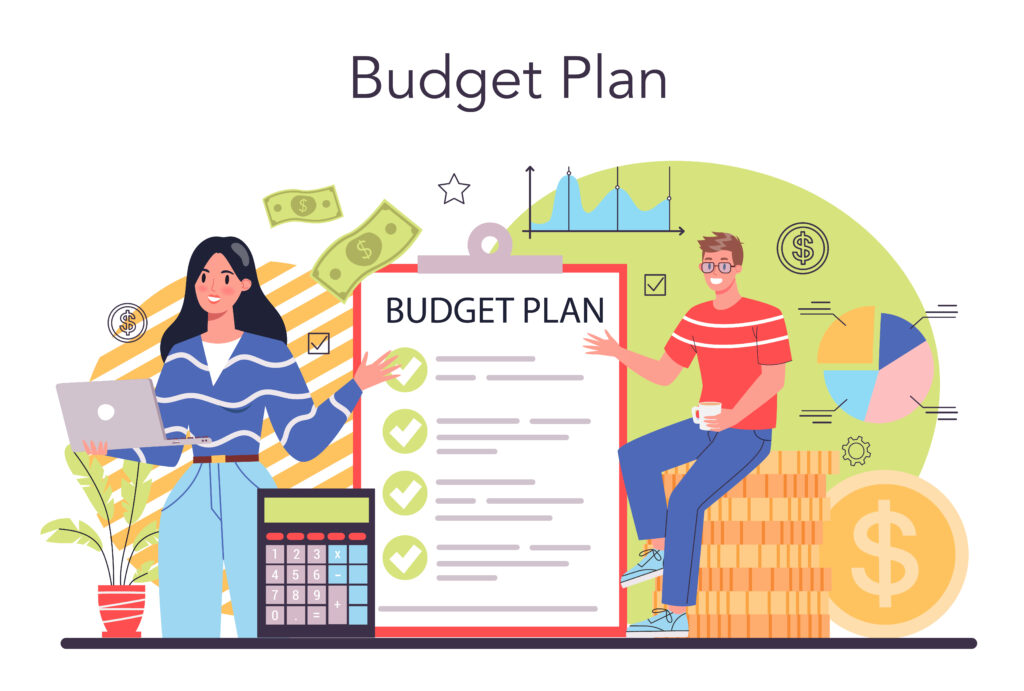
An event comprises a wide array of elements to be handled from Invitations, entrance, stage, décor, lights, screen, and audio-visual devices to catering, hosts, guests, human resources, and much more. But before getting into the execution, deciding upon a budget is where the real challenge lies. Budgeting is an initial foundation for building any event and it decides the shape and structure of the same. Hence, budgeting becomes a very crucial stage to begin with for any event, whether it be a corporate, wedding, or sports event.
It’s no secret that budgeting can be a challenging task but planning the budget wisely can play a key role in the success of any event. In this blog, we are going to highlight the top five key strategies to help you stay on track with your event budget, from initial planning to post-event takeaways.
Here are the budgeting strategies that will help you plan everything like a pro! Let’s understand.
1. Setting a Budget: Clear & realistic:
The successful execution of any budget depends upon the objectives and goals of any event which is the basis of planning a budget. Budget planning is a foundational step for devising a perfect budget plan for the event, hence, it should be stated clearly with realistic goals. Factors like event scale, size of the venue, number of attendees etc must be considered.
Set priorities for tasks:
Create a priority list for all tasks to be executed, ensuring a strategic balance between essential and flexible budget allocations. Some elements, like audio-visual aids for a Rewards & Recognition ceremony, are non-negotiable due to client specifications. Meanwhile, aspects like generators, backups, and other event essentials can be optimized without compromising overall execution. Identifying these priorities ensures seamless planning while maintaining cost efficiency.
Do Research:
For an accurate initial budget, conduct proper research, collect information from the existing industrial averages, and consult with vendors to get a sense of the price range for various services. Make sure to consider all the hidden costs like service charges, taxes, and duties that have to be paid in the process.
Contingency Planning:
Even after careful planning, some unexpected expenses are bound to occur. It is advisable to keep 10%-15% cost of the total budget as a contingency cost for some relief in case of handling unexpected costs, whether it’s a last-minute change in the number of attendees or an upgrade to the technology you need for the event.
2. Track Expenses:
Once a tentative budget is set, it is necessary to monitor all the expenses during the execution of the operations. It is necessary to keep a close eye on every payment made and costs incurred. This helps to identify and avoid unnecessary costs.
Using budgeting tools:
Using spreadsheets or Excel sheets for monitoring the budget and expenses is considered unconventional often. However, the use of specialized budgeting platforms like Excel, Google Sheets, or specialized event budget planners can help with the allocation of funds, tracking payments, and avoiding costly mistakes.
Categorize your costs and monitor vendor payments:
Divide the total budget into various different categories such as venue, catering, décor, entertainment, marketing, and staff. Simultaneously it is crucial to track the payments made to the vendor as it gets complicated in the final stage.

3. Negotiate with Vendors and Suppliers:
Negotiating with the vendor gives a way to incorporate flexibility within the budget. It is one of the most effective ways to stay on the budget, especially during booking various services for the event like venue, caterer, etc.
Get multiple quotations:
Don’t make the final decision without checking multiple quotations. Get multiple quotations from different vendors for different functionalities to enable comparison and better negotiation.
Added Services:
In some cases, the vendor will not be able to negotiate the final cost, but they may be ready to add some complimentary value-added services. For instance, a venue owner can offer complimentary VR services or a caterer may offer complimentary desserts.
Consider exploring unconventional service vendors to optimize costs without compromising the experience. Renting décor instead of purchasing, or opting for a more casual catering approach like food trucks or buffet-style dining can offer the same delightful experience at a more budget-friendly price
4. Monitor the Attendance:
The number of attendees at the event can be a significant factor to consider when planning an event as it highly influences the event’s overall cost, particularly for catering, venue size, and materials. Hence it is very important to maintain an approximate count of attendees.
Underestimate the count:
It is always advisable to underestimate the count of attendees for a safer budget. The vendors can make a few last-minute adjustments for slightly higher attendance but once the actual budget is overestimated it leads to unnecessary expenses.
Offer Early-Bird Discounts:
One way to ge.t a better handle on attendance numbers is to introduce early-bird registration or ticket sales. Offering early bird discounts can give you an idea of how many people are expected to attend the event. Knowing the number of attendees allows you to make the necessary adjustments in the overall budget.
Alter the budget for low Attendance:
If low attendance is estimated immediate steps must be taken to adjust the budget. This could involve negotiating with the caterer to reduce the number of meals or choosing a smaller venue. Monitoring the number of attendees and acting quickly will help prevent unnecessary costs, spending, and wastage of resources.
5. Conduct a post-event review:
Once the event is successfully done, it is essential to conduct a post-event review to know the efficiency of the existing marketing strategies that can help in planning future budgets and strategies.
Focus on the following points:
- Compare the planned budget to the actual budget.
- Evaluate the services and arrangements at the event and the cost paid for them.
- Check the efficiency of the existing strategies.
Conclusion:
Planning and following the budget is key to crafting a successful event. A budgeting strategy is the backbone of any event. By setting clear objectives and goals, an efficient budgeting strategy can be devised. However, adjusting the budget and event requirements must be done wisely to avoid any compromise in the quality of any event. Sticking to a budget should not affect the event, this could be done by making good decisions and deals according to the requirements.
Staying within budget while executing a flawless event can be challenging, but that’s where an expert event management company steps in. From budgeting and planning to vendor negotiations and seamless execution, Rapture Events ensures every detail is managed with precision. Let’s connect and turn your next event into a well-planned success without budget stress!
